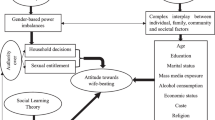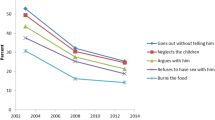Abstract
Despite the recent increase in public and professional interest in the problem of wife beating in Arab society, in Israel, and in the rest of the Arab world, there is a serious lack of empirical research on different dimensions of the problem in those societies. This paper presents the results of a survey conducted among a systematic random sample of 362 Arab husbands from Israel, in an attempt to examine the contribution of patriarchal ideology toward explaining their beliefs about wife beating. Although about 58% of the participants indicated that there is no excuse for a man to beat his wife, 15–62% still justified wife beating on certain occasions (e.g., adultery, failure to obey husbands, disrespect for parents and relatives). In addition, although the participants tended to perceive abusive and violent husbands as responsible for their behavior, 52% still expressed understanding of that behavior and, on some occasions, 23–43% even blamed the wife for violence against her. Regression and multiple regression analyses revealed that over and above the participants' age and level of education, their masculine sex-role stereotypes, negative and traditional attitudes toward women, nonegalitarian marital role expectations, and familial patriarchal beliefs were the most significant predictors of beliefs about wife beating. Implications of the results and limitations of the study are also discussed.
Similar content being viewed by others
References
Abdo-Zubi, N. (1992). Family, Women, and Social Change in the Middle East: The Palestinian Case, Canadian Scholars' Press, Toronto.
Bailey, K. D. (1982). Methods of Social Research, 2nd edn., Free Press, New York.
Barakat, H. (1993) The Arab World: Society, Culture, and State, University of California Press, Berkeley.
Bograd, M. (1984). Family systems approaches to wife battering: A feminist critique. Am. J. Orthopsychiatry 54: 558–568.
Burt, M. R. (1980). Cultural myths and support for rape. J. Pers. Soc. Psychology 38: 217–230.
Carlson, B. E. (1984). Causes and maintenance of domestic violence: An ecological analysis. Soc. Serv. Rev. 58: 569–587.
Choi, A., and Edleson, J. L. (1996). Social disapproval of wife assaults: A national survey of Singapore. J. Comp. Fam. Stud. 27(1): 73–88.
Dobash, R. E., and Dobash, R. P. (1979). Violence Against Wives, Free Press, New York.
Dobash, R. E., and Dobash, R. P. (1992). Women, Violence, and Social Change, Routledge, London.
Dunn, M. (1960). Marriage role expectations of adolescents. Marriage and Family Living, 22: 55–66.
Dunn, M., and DeBonis, N. J. (1979). Teachers' and Counselors' Guide to Accompany a Marriage Role Expectations Inventory, Family Life, Saluda, NC.
Dutton, D. G. (1988). The Domestic Assault of Women, Allyn and Bacon, Boston.
Dutton, D. G. (1994). Patriarchy and wife assault: The ecological fallacy. Violence Vict. 9(2): 167–182.
Edleson, J. L., Eisikovits, Z. C., and Guttman, E. (1985). Men who batter women: A critical review of the literature. J. Fam. Issues 6(2): 229–247.
Edleson, J. L., and Tolman, R. M. (1992). Intervention for Men Who Batter: An Ecological Approach, Sage, Newbury Park, CA.
Ewing, C. P., and Aubrey, M. (1987). Battered women and public opinion: Some realities about the myths. J. Fam. Violence 2: 257–264.
Gentemann, K. (1984). Wife beating: Attitudes of a non-clinical population. Victimology 9: 109–119.
Gerber, G. L. (1991). Gender stereotypes and power: Perceptions of the roles in violent marriages. Sex Roles 24: 439–458.
Gerber, G. L. (1995). Gender stereotypes and the problem of marital violence. In Adler, L. L., and Denmark, F. L. (Eds.), Violence and the Prevention of Violence, Praeger, Westport, CT, pp. 145–155.
Gondolf, E. W. (1985). Men Who Batter: An Integrated Approach for Stopping Wife Abuse, Learning, Holmes Beach, FL.
Greenblat, C. S. (1985). “Don't hit your wife...unless”: Preliminary findings on normative support for the use of physical force by husbands. Victimology 10: 221–241.
Haj-Yahia, M. M. (1991). Perceptions of Wife Beating and the Use of Different Conflict Tactics Among Arab–Palestinian Engaged Males in Israel, PhD Dissertation, University of Minnesota.
Haj-Yahia, M. M. (1995). Toward culturally sensitive intervention with Arab families in Israel. Contemp. Fam. Ther. 17(4): 429–447.
Haj-Yahia, M. M. (1996). Wife abuse in the Arab society in Israel: Challenge for future change. In Edleson, J. L., and Eisikovits, Z. C. (Eds.), The Future of Interventions With Battered Women and Their Families, Sage, Thousand Oaks, CA, pp. 87–101.
Haj-Yahia, M. M. (1997). Predicting beliefs about wife beating among engaged Arab men in Israel. J. Interpers. Violence 12(4): 530–545.
Haj-Yahia, M. M. (1998a). A patriarchal perspective on beliefs about wife-beating among Arab Palestinian men from the West Bank and Gaza Strip. J. Fam. Issues 19(5): 595–621.
Haj-Yahia, M. M. (1998b). Perceptions of abusive and violent husbands by engaged Arab men from Israel. J. Soc. Psychol. 138(6): 772–786.
Haj-Yahia, M. M. (1998c). Beliefs about wife-beating among Palestinian women: The influence of their patriarchal ideology. Violence Against Women 4(5): 533–558.
Haj-Yahia, M. M., and Edleson, J. L. (1994). Predicting the use of conflict resolution tactics among engaged Arab–Palestinian men in Israel. J. Fam. Violence 9(1): 47–62.
Harway, M. (1993). Battered women: Characteristics and causes. In Hansen, M., and Harway, M. (Eds.), Battering and Family Therapy: A Feminist Perspective, Sage, Newbury Park, CA, pp. 29–41.
Heise, L. L. (1998). Violence against women: An integrated, ecological framework. Violence Against Women 4(3): 262–290.
Hui, H. C., and Triandis, H. C. (1985). Measurement in cross-cultural psychology: A review and comparison of strategies. J. Cross-Cultural Psychol. 16: 131–152.
Jubran, R. (1994). Characteristics of the non-Jewish population in Israel. Economics Work 9: 213–235. (In Hebrew)
Kandiyoti, D. A. (1987). Emancipated but unliberated? Reflections on the Turkish case. Feminist Stud. 13(2): 317–338.
Klein, E., Campbell, J., Soler, E., and Ghez, M. (1997). Ending Domestic Violence: Changing Perceptions/Halting the Epidemic, Sage, Thousand Oaks, CA.
Marlowe, D., and Crowne, D. P. (1961). Social desirability and response to perceived situational demands. J. Consult. Psychol. 25: 109–115.
Moghadam, V. M. (1992). Patriarchy and the politics of gender in modernizing societies: Iran, Pakistan and Afghanistan. Int. Sociol. 7(1): 35–53.
Mugford, J., Mugford, S., and Easteal, P. (1989). Social justice, public perceptions, and spouse assault in Australia. Soc. Just. 16: 102–123.
Russell, M. N., and Frohberg, J. (1995). Effectiveness of belief system change in treatment of abusive men. Paper presented at the Fourth International Family Violence Research Conference, University of New Hampshire, Durham, NH.
Saunders, D. G., Lynch, A. B., Grayson, M., and Linz, D. (1987). The Inventory of Beliefs About Wife Beating: The construction and initial validation of a measure of beliefs and attitudes. Violence Vict 2: 39–57.
Shokeid, M. (1993). Ethnic identity and the position of women among Arabs in an Israeli town. In Azmon, Y., and Izraeli, D. N. (Eds.), Women in Israel, Transaction, New Brunswick, NJ, pp. 423–441.
Smith, M. D. (1990). Patriarchal ideology and wife beating: A test of a feminist hypothesis. Violence Vict. 5(4): 257–274.
Spence, J. T., and Helmreich, R. (1978). Masculinity and Femininity: Their Psychological Correlates and Antecedents, University of Texas Press, Austin.
Sugarman, D. B., and Frankel, S. L. (1996). Patriarchal ideology and wife assault: A meta-analytic review. J. Fam. Violence 11(1): 13–40.
United Nations (1989). Violence Against Women in the Family, Center for Social Development and Humanitarian Affairs, United Nations Office Vienna.
United Nations (1993). Strategies for Confronting Domestic Violence: A Resource Manual, Center for Social Development and Humanitarian Affairs, United Nations Office, Vienna.
Yllo, K. A. (1984). The status of women, marital equality and violence against wives: A contextual analysis. J. Fam. Issues 5: 307–320.
Yllo, K. A. (1988). Political and methodological debates in wife abuse research. In Yllo, K., and Bograd, M. (Eds.), Feminist Perspectives on Wife Abuse, Sage, Newbury Park, CA, pp. 28–50.
Yllo, K. A., and Straus, M. A. (1990). Patriarchy and violence against wives: The impact of structural and normative factors. In Straus, M. A., and Gelles, R. J. (Eds.), Physical Violence in American Families, Transaction, New Brunswick, NJ, pp. 383–399.
Author information
Authors and Affiliations
Corresponding author
Rights and permissions
About this article
Cite this article
Haj-Yahia, M.M. Beliefs About Wife Beating Among Arab Men from Israel: The Influence of Their Patriarchal Ideology. Journal of Family Violence 18, 193–206 (2003). https://doi.org/10.1023/A:1024012229984
Issue Date:
DOI: https://doi.org/10.1023/A:1024012229984




